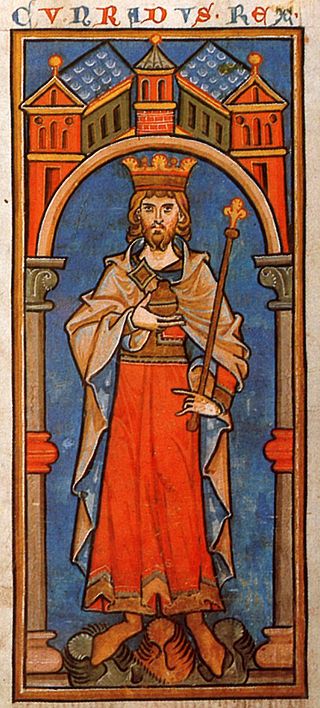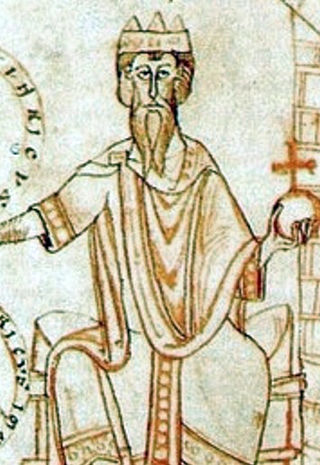Conrad II or Konrad II may refer to:

Conrad III of the Hohenstaufen dynasty was from 1116 to 1120 Duke of Franconia, from 1127 to 1135 anti-king of his predecessor Lothair III, and from 1138 until his death in 1152 King of the Romans in the Holy Roman Empire. He was the son of Duke Frederick I of Swabia and Agnes, a daughter of the Salian Emperor Henry IV.

Conrad II, also known as Conrad the Elder and Conrad the Salic, was the emperor of the Holy Roman Empire from 1027 until his death in 1039. The first of a succession of four Salian emperors, who reigned for one century until 1125, Conrad ruled the kingdoms of Germany, Italy and Burgundy.

The House of Zähringen was a dynasty of Swabian nobility. The family's name derived from Zähringen Castle near Freiburg im Breisgau. The Zähringer in the 12th century used the title of Duke of Zähringen, in compensation for having conceded the title of Duke of Swabia to the Staufer in 1098. The Zähringer were granted the special title of Rector of Burgundy in 1127, and they continued to use both titles until the extinction of the ducal line in 1218.
Conrad I or Konrad I may refer to:

Conrad II of Italy, also known as Conrad (III) (12 February 1074 – 27 July 1101), was the Duke of Lower Lorraine (1076–1087), King of Germany (1087–1098) and King of Italy (1093–1098). He was the second son of Holy Roman Emperor Henry IV and Bertha of Savoy, and their eldest son to reach adulthood, his older brother Henry having been born and died in the same month of August 1071. Conrad's rule in Lorraine and Germany was nominal. He spent most of his life in Italy and there he was king in fact as well as in name.
Konrad is a German given name and surname that means "bold counselor" and may refer to:
Conrad V or Konrad V may refer to:

Vladislaus II or Vladislav II was the Duke of Bohemia from 1140 and then King of Bohemia from 1158 until his abdication in 1173. He was the second Bohemian king after Vratislaus II, but in neither case was the royal title hereditary.
Conrad II, called the Younger, a member of the Salian dynasty, was the duke of Carinthia and margrave of Verona from 1035 until his death.
Conrad I, called the Great, a member of the House of Wettin, was Margrave of Meissen from 1123 and Margrave of Lusatia from 1136 until his retirement in 1156. Initially a Saxon count, he became the ruler over large Imperial estates in the Eastern March and progenitor of the Saxon electors and kings.

The Archdiocese of Salzburg is a Latin Church archdiocese of the Catholic Church in Austria. The archdiocese is one of two Austrian archdioceses, serving alongside the Archdiocese of Vienna.

Conrad is a Germanic masculine given name and a surname.

Konrad Laskonogi, was a Duke of Głogów since 1177 until his death.

The Duchy of Bernstadt was a Silesian duchy centred on the city of Bernstadt in Lower Silesia and formed by separation from the Duchy of Oels (Oleśnica). It was first ruled by the Silesian Piasts dynasty, until its extinction in 1492. In 1495 it and the Duchy of Oels passed to the Dukes of Münsterberg, who came from the House of Poděbrady. In 1647 the Duchy of Bernstadt passed by marriage to the Dukes of Württemberg.

Conrad I was Duke of Zähringen from 1122 until his death and from 1127 also Rector of Burgundy. He spent most of his life stemming the growing power of the House of Hohenstaufen and to this end, allied himself with the House of Guelph.
Conrad IV of Germany (1228–1254) was King of Germany from 1237 to 1254.

Conrad of Babenberg was a nobleman and prelate of the Holy Roman Empire. He was the bishop of Passau from 1148/1149 until 1164 and then archbishop of Salzburg until his death, although he lost control of Salzburg when he was placed under the imperial ban in 1166.
This page is based on this
Wikipedia article Text is available under the
CC BY-SA 4.0 license; additional terms may apply.
Images, videos and audio are available under their respective licenses.










